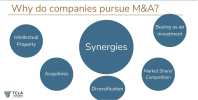- Date
- 4 December 2023
Full Disclosure:
Why do companies buy companies?
By Jaysen Sutton |
Hi Reader 👋🏽,
It's important to understand why companies buy other companies. In case studies and group exercises; it’s common to find a situation where you have to decide which company a buyer should buy or whether to go ahead with a particular deal.
I find the key starting point is to take a step back and understand what fuels the decision making behind most companies.
Put simply, companies are driven by shareholders (the owners of companies) who want to make a return on their investment. If the value of a company goes up, so should the value of its shares, and the shareholders stand to make more money because they can sell these shares for more than they originally bought them for. The incentives for the people running a company (including their compensation) are therefore directed towards growth.
Now, one option for a company is to pursue organic growth. You invest your own money to grow. You hire a sales team to drive more sales, you expand into a new market, or maybe you build a new product. But organic growth takes time and you might not have the capital to achieve what you want to achieve anyway.
For example, suppose with TCLA, we wanted to develop a new artificial intelligence (AI) product that delivers mock interviews for students. Now, I wouldn’t know how to build this myself, so I’d need to hire a team with this expertise. We’d have to take months, maybe years, working out how to launch this new AI product. This comes at the cost of doing something else. This is called the opportunity cost. Would we have been better off spending our time doing something else?
This is where inorganic growth comes in. Sometimes, it’s more effective to buy a company with the capability, technology or distribution you want than to build it yourself. For example, buying an AI company would mean TCLA would acquire the expertise it needed immediately (rather than spending years to build it) and provide us with a capability we didn’t already have.
Now, to come back to the point, the key driver behind M&A deals is that it allows a buyer to achieve its goal of making more money faster than it would otherwise, which is important in a market where there are many competitors.
The value proposition is based on the concept of synergy, which is sometimes expressed as 2+2=5.
You might be thinking, ‘but Jaysen, 2 + 2 = 4!’ I hear you. The additional ‘1’ in this case, reflects the additional value that a company expects to create from synergies. The idea is that a company that merges together becomes more valuable than the two separate companies.
For example, suppose TCLA bought LegalEd, an app used by thousands of students to study for their law degree. In buying LegalEd, TCLA would have immediate access to LegalEd’s distribution channel among students and graduates. It would also have a new product (a law studying app) that would complement TCLA's existing products and services. Our decision to buy LegalEd would be based on the idea that TCLA would make more money combining with LegalEd, leveraging their existing distribution channel, than if we tried to build the app ourselves. We call this revenue synergies.
I could also benefit from cost synergies. Suppose LegalEd had a system to manage its documents and communication as a team. TCLA also has its own system for managing documents and communication. We’ll save money because we don’t need two systems, and it won’t cost us the same amount to extend our existing system across more people.
Acquihires, intellectual property and financial sponsors
Okay, let’s take stock. We are exploring the question of why companies buy companies. We understand that companies fundamentally care about making more money, which is why they choose to grow. We also understand that they pursue M&A as a form of inorganic growth because it’s faster and provides the opportunity to acquire a capability the company didn’t already have.
We also explored the concept of synergies, which is a key reason companies combine. These can be broken down into cost and revenue synergies and reflects the cost savings and greater value from combining a company than staying separate.
Let’s talk about some other reasons a company would buy another company. I’ll focus on the areas that tend to come up in case studies the most.
The first is acquihires, which refers to a company buying another company for the expertise of the employees. You can think of why this might be the case: the success of a company is down to its people. Hiring superstars with technical knowledge can make a huge difference to the success of a company. Sometimes, it’s cheaper to buy the whole company and bring the team of employees over rather than trying to convince them to join (or have them compete with you).
The second is intellectual property, which is the legal rights that protect certain types of ideas and information. Here, we are typically referring to patents, copyrights and trademarks. The knowhow and capabilities gained from acquiring intellectual property can give a company a competitive advantage, which is why it is a common driver of acquisitions, especially in sectors like technology and pharmaceuticals.
Lastly, it’s useful to note that so far we have been discussing M&A in the context of strategic acquisitions, which refers to companies that are buying companies with the goal of growing together in the long-term. However, it’s important to note that some companies buy companies for the financial returns it can generate. This is the domain of financial sponsors, such as private equity firms, which may buy a company with the goal of selling the company for a return to the firm and its investors.
I hope this has helped you to better understand the driving factors behind why companies buy companies and what to look out for in law firm interviews.
I'll only flag at this point that this all depends on everything going well. There is a body of evidence that suggests most mergers fail.
Have any thoughts? I'd love to hear your perspective below!
| ❓Contact [email protected] with any queries. |


